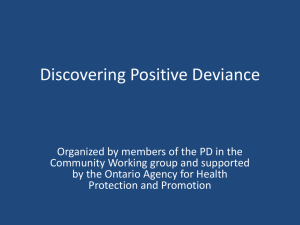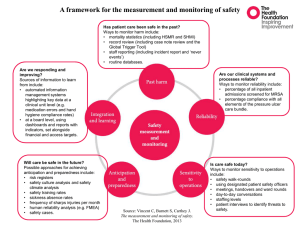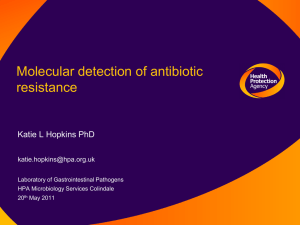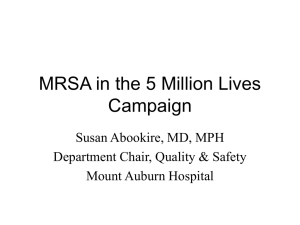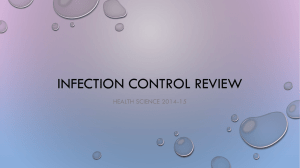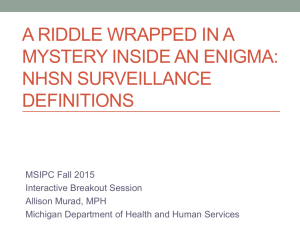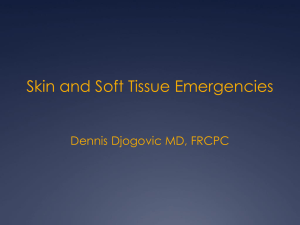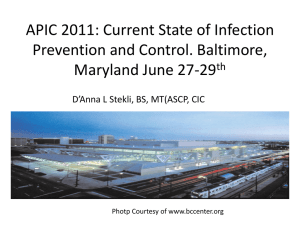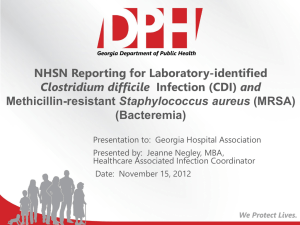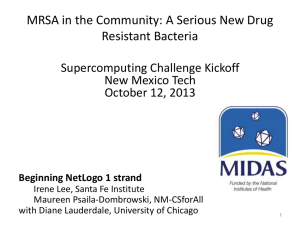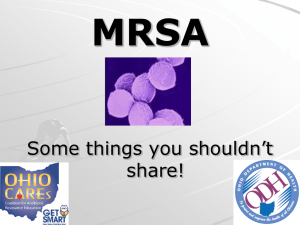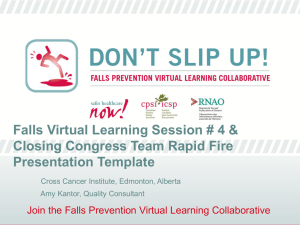Connecticut Program Update
advertisement
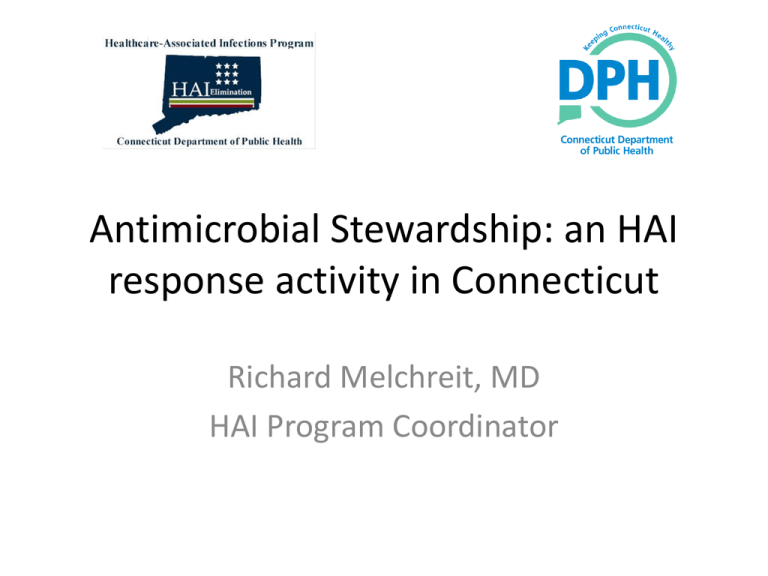
Antimicrobial Stewardship: an HAI response activity in Connecticut Richard Melchreit, MD HAI Program Coordinator National Metrics and 5-Year Targets Metric National 5-year Base/Target Source Prevention year Target On Track? Bloodstream Yes NHSN 50% reduction 2006-8/2013 infections Clostridium difficile (hospital HCUP 30% reduction 2008/2013 No discharges) Clostridium Data not yet available NHSN 30% reduction 2010-11/2015 difficile infections Urinary tract NHSN 25% reduction 2006-8/2013 Yes infections MRSA invasive infections EIP 50% reduction 2007-8/2013 Yes (population) MRSA bacteremia Data not yet available NHSN 25% reduction 2010-11/2015 (hospital) Surgical site Yes NHSN 25% reduction 2006-8/2013 infections Source: http://www.hhs.gov/ash/initiatives/hai/nationaltargets/index.html#table1 CMS Reporting Requirements: sorted by year Year HAI Event Facility type/location 2011 CLABSI ACH/ICUs 2012 CAUTI ACH/ICUs SSI:COLO, SSI:HYST ACH/all inpatient DE Outpatient Dialysis MRSA bacteremia LabID, CDI LabID ACH/all inpatient HCW vaccination ACH CLABSI, CAUTI LTACH/all inpatient CAUTI IRF/adult, pediatric wards CLABSI, CAUTI ACH/wards HCW vaccination ACH/outpatient; LTACH, IRF, ASC MRSA bacteremia LabID, CDI LabID LTACH/all inpatient 2013 2015 CSTE recommendation: CDI reporting (NHSN) to public health departments Organism/ specimen Type of facility Type of location Time frame 2013 C. difficile Infection LabID Event 2014 Acute Care Hospitals All inpatient LTACH All inpatient X CHA All inpatient X IRF All inpatient X Other non IQR All inpatient LTCFs* All residents 2015 Exceptions 2016 X NICUs, well baby nurseries X x * Will require enough facilities to develop the infrastructure and skills necessary to effectively use NHSN. CSTE recommendation: MRSA Bacteremia reporting (NHSN) to public health departments Organism/ specimen Type of facility Type of location Time frame 2013 MRSA Bacteremia LabID Event 2014 Acute Care Hospitals All inpatient LTACH All inpatient X CAH All inpatient X IRF All inpatient X Other non IQR All inpatient LTCFs* All residents 2015 Exceptions* 2016 X None X x * Will require enough facilities to develop the infrastructure and skills necessary to effectively use NHSN. Methods and Case Definitions Invasive (sterile site) MRSA isolates reported from labs statewide Medical Record Review Hospital-Onset (HO-MRSA) Isolate collected >2 days after hospital admission Community-Associated (CA-MRSA) No HACO risk factors Health Care-Associated Community-Onset (HACO-MRSA) -Central venous line at time of culture -Hospitalization, surgery, dialysis, or LTCF residence in year before culture Incidence of MRSA by Place of Onset and Year, Connecticut, 2001-2011 All MRSA Rate per 100,000 population 30 HO HACO CA 25 p<0.01a 20 15 p<0.01a 10 p<0.01a p<0.01a 5 0 2001 2002 2003 2004 2005 2006 2007 2008 2009 2010 2011 2012 Year aChi-square for trend Revised Annualized National Estimates, ABCs MRSA 2005-2010 (updated Nov, 2012) Estimated No. Infections, U.S. 120,000 100,000 80,000 60,000 Overall CA HO 40,000 HACO 20,000 0 2006 2007 2008 2009 2010 2011 Revisions include: 2005 Adjustment for dialysis; incorporation of interval estimates (not included);enhanced case finding (TN) and resolved data transmission error (2006-2007). Data accessed (frozen) November 2012. Revised Annualized National Estimates, ABCs MRSA 2005-2010 (updated Nov, 2012) Estimated No. Infections, U.S. 120,000 100,000 80,000 Overall CA 60,000 HO ~50% were discharged from acute care in previous 3 months 40,000 20,000 HACO ~27% were outpatient dialysis patients 0 2005 2006 2007 2008 2009 2010 2011 Revisions include: Adjustment for dialysis; incorporation of interval estimates (not included);enhanced case finding (TN) and resolved data transmission error (2006-2007). Data accessed (frozen) November 2012. Vancomycin-resistant Enterococci (VRE) Connecticut: 2000-2010 VRE Incidence by Age VRE Incidence by Hospital Staffed Bed Size Percent Percent of CLABSI organisms that were VRE or MRSA: 2009-2012 18.0 16.0 14.0 12.0 10.0 8.0 6.0 4.0 2.0 0.0 2009 2010 VRE 2011 MRSA 2012 Percent of CAUTI and SSI organisms that were VRE or MRSA 2012 Type of Infection Total number of pathogens isolated Number (Percent) VRE Number (Percent) MRSA CAUTI 543 23 (4.2) 1( .2) SSIs related to colon surgeries 191 7 (3.7) 13 (6.8) Emerging Infections Program HAI prevalence survey CT 2011 EIP Antimicrobial Use Survey CT 2011 Carbapenem-resistant Enterobacteriacea • Two KPC isolates from CT hospitals confirmed by CDC • One NDM • NHSN has reporting capability • Laboratories report CREs in some other states • Laboratory Reportable Condition 2014 CRE Laboratory Reporting Algorithm Is the specimen a clinical isolatefrom a sterile site, sputum, or urine?1 No Yes Is the organism I or R to Doripenem, Imipenem, or Meropenem ? Is the organism R STOP do not report No STOP do not report Yes # of carbepenems (DOR, IMI, MERO) that are (I or R) plus Ertapenem (only if R) 2 or more 1 I or R to any and all 3rd generation cephalosporins ≥ 30 days since last clinical isolate Yes Yes No Is isolate Proteus, Morganella, or Providencia? Report isolate via OL-15C Is this a new genus/species or a new resistance profile compared to previous Yes I or R to Imipenem? Intermediate Yes Resistant No No Report isolate via OL-15C Go to 1If more than one clinical isolate is collected on the same, first date of collection - report only the isolate from the most invasive source: CSF>Blood/Body Fluid>Sputum>Urine; 2 If within 30 calendar days a second, more invasive isolate is collected additional reporting is not required. National Center for Emerging and Zoonotic Infectious Diseases Division of Healthcare Quality Promotion Fair Haven Community Health Center HCHC project • AMS in the outpatient setting (70% of patients are Latino) • Assessment of AMS (facility level) • Provider and patient knowledge, attitude, practices assessment • Provider, patient education (Get Smart materials) • Chart reviews to assess prescribing Upcoming DPH activities • Commissioner’s Call to Action for antimicrobial stewardship • Antimicrobial stewardship survey of acute care hospitals • Posting of hospital-specific 2012 CLABSI, CAUTI, and SSI (COLO, HYST) data on DPH website • Emerging Infections Program: antimicrobial use paper (descriptive) and new appropriateness survey
